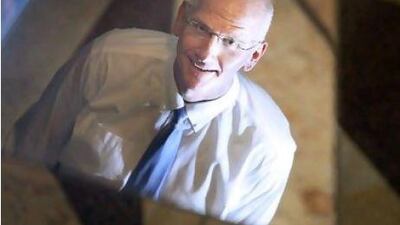Jeff Bezos was working as a financial analyst in the 1990s when he stumbled on a website that said the internet was growing by 2,300 per cent a year.
He started researching what he could sell and settled on books, founding Amazon, now the world's largest online retailer.
Mr Bezos may have been blessed with the ability think innovatively, but it is a skill that everybody can learn, says Hal Gregersen, an affiliate professor of leadership at Insead business school in Abu Dhabi who has co-authored a book on the subject called The Innovator's DNA. "The name of the book may suggest that this is genetic and you're coded one way or the other and you've got it or you haven't. But the reality is that it's not genetic," he says.
Research with identical twins who grew up in different environments found that on IQ tests, the differences were found to be about 80 per cent genetic, compared with just 30 per cent with creativity.
"It's part nature, but not enough that it would condemn us to not be able to get new ideas," says Prof Gregersen.
He and his co-authors interviewed about 100 creative people, including Mr Bezos, and asked them what they were doing when they got their innovative ideas.
"Essentially, as we started hearing their stories, the patterns were hauntingly similar. They were doing a lot of the same stuff … It landed into five skills that they are literally things we can learn," Prof Gregersen says.
Asking provocative questions is a must. Innovators question everything around them in the way that Mr Bezos did when he was working out how he could capitalise on the internet's increasing popularity.
Another skill is associating - the ability to make connections. Mike Lazaridis at Research In Motion used association when he recalled a conversation with a high school teacher who told him that wireless was the future.
"He's sitting in the conference and there's someone presenting from a telephone company in Japan and he's speaking about this new technology where a Coca-Cola machine can wirelessly transmit inventory of the machine back to the factory so they can know to ship more Coke to the machine," says Prof Gregersen. "When Lazaridis hears wireless he remembers the teacher's comment … He's like, what's going on here with wireless that I could do?"
The association led to the first two-way wireless pager technology and ultimately the BlackBerry.
Observing the world around them, networking for ideas by mixing with others and experimenting are the other key skills.
Prof Gregersen and his fellow authors surveyed 6,000 executives, managers and entrepreneurs around the world, about 700 of whom work in the Middle East, largely in the UAE.
"What we found in the data is these 6,000 other people who aren't quite as famous, if they do the same stuff, they get the same results," says Prof Gregersen.
Innovative companies encourage ideas and know how to deliver on them.
"[They] have the philosophy that says do it, take the risks, because we have all the stuff to support you," he says.
But how innovative are companies in the UAE? Do they have the people, the process and the necessary philosophies in place?
It is "somewhat rare", he says, but one company that has proved itself to be innovative is the Tourism Development and Investment Company, which has done a good job of getting new ideas, developing them and delivering on them.
"The UAE challenge is the following: you have essentially family businesses," he says. "In that sort of environment alone there is a tendency … to have a more strict hierarchy … so one of the challenges becomes that am I ready to invite and reward other people for getting new ideas and those ideas are challenging the fundamental way we do things around here.
"I think that's one of the big questions for UAE companies."


